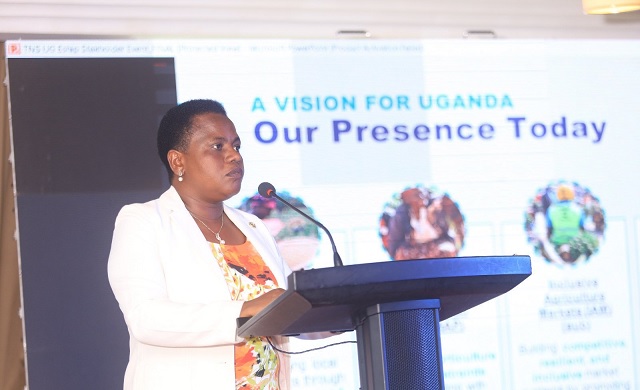
The local business face numerous challenges including low literacy, market access, political dynamics, and climate change affecting particularly women and young entrepreneurs
Kampala, Uganda | PATRICIA AKANKWATSA | In a significant stride towards unlocking the vast potential of Micro, Small, and Medium-sized Enterprises (MSMEs) and catalyzing Uganda’s economic development, TechnoServe has orchestrated a high-level roundtable forum.
In collaboration with key stakeholders, the event emphasized the pivotal role played by MSMEs in fostering innovation, inclusivity, and collaboration, contributing to the development of sustainable entrepreneurship ecosystems in the nation.
Juliet Kyokunda, the Country Director of TechnoServe Uganda, emphasized the need for alternative solutions and support to address the numerous challenges facing SMEs including those dealing in cash crops like vanilla farmers.
“SMEs contribute up to 40% of Uganda’s GDP and play a vital role in local communities. TechnoServe aims to empower these entrepreneurs with training and guidance to improve their businesses and enhance local employment prospects,” she said.
TechnoServe, operational for nearly 50 years across 30 countries, has actively engaged with entrepreneurs, farmers, cooperatives, suppliers, and processors.
The organization focuses on key sectors such as dairy, coffee, horticulture, maize, and beans to foster competitive industries. MSMEs in Uganda, like in other developing nations, grapple with resource limitations, hindering their ability to keep pace with global innovation trends.
The roundtable forum, themed “Innovation and Inclusion: Collaboration for Sustainable Entrepreneurship Ecosystem,” served as a platform for stocktaking, fostering relationships, and addressing challenges within the sector.
Alice Warweru, Director for Entrepreneurship Programs for East Africa at TechnoServe, highlighted challenges such as low literacy, market access, political dynamics, and climate change affecting SMEs, particularly women and young entrepreneurs.
“TechnoServe’s work focuses on addressing these issues through capacity building and linking people to information, capital, and markets,” said Warweru, adding that one of TechnoServe’s impactful initiatives is the Coffee Farm College Program which is enhancing coffee farming productivity.
Julius Byaruhanga, Director of Policy and Business Development at the Private Sector Foundation Uganda, highlighted the absence of a startup policy as a key hurdle in developing the country’s MSMEs.
He revealed that efforts are currently underway, in collaboration with the Ministry of Trade, to rectify this gap.
Katarina Kahlmann, the Chief Program Officer at TechnoServe, underscored the collective will to create an inclusive, innovative, and sustainable entrepreneurship ecosystem, with MSMEs leading the charge in driving economic development and improving the livelihoods of Ugandans.
“We believe in the power of the individual. That’s why we are in this field, for being able to see the impact our work has on our clients and the people at large is everything to us,” Kahlmann said.
 The Independent Uganda: You get the Truth we Pay the Price
The Independent Uganda: You get the Truth we Pay the Price





